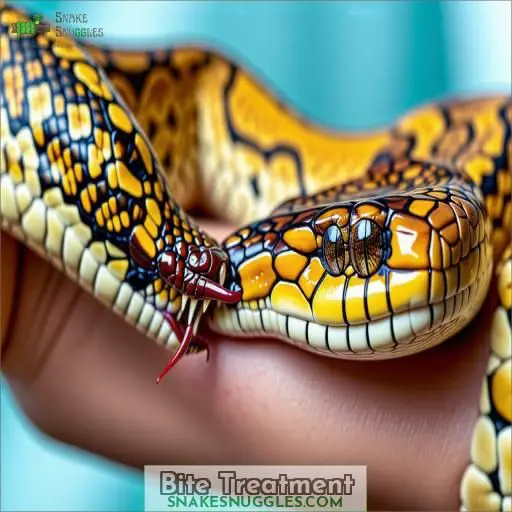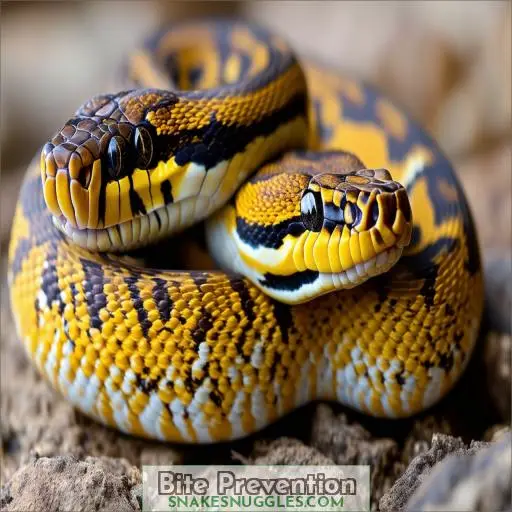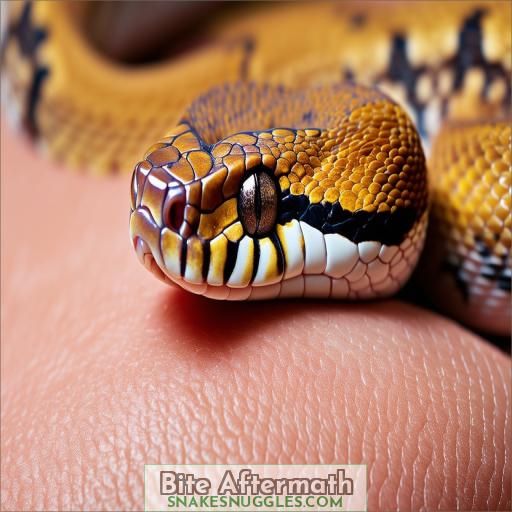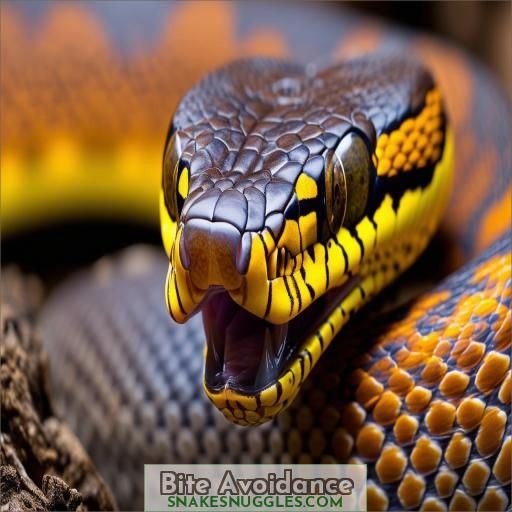This site is supported by our readers. We may earn a commission, at no cost to you, if you purchase through links.
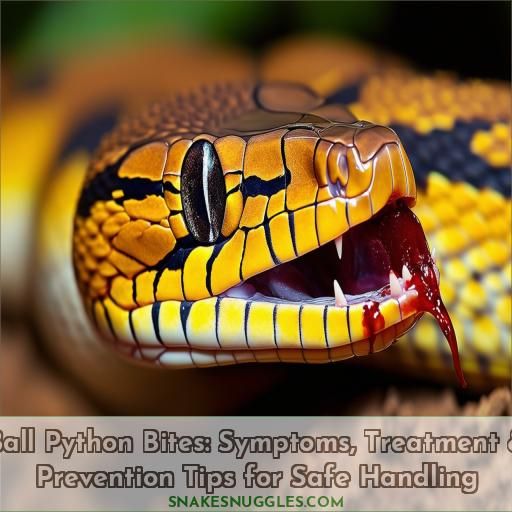 When a ball python bites, you’ll notice small puncture wounds, mild redness, and swelling. Though the bite is usually quick and relatively painless, you might experience some discomfort similar to a cat scratch.
When a ball python bites, you’ll notice small puncture wounds, mild redness, and swelling. Though the bite is usually quick and relatively painless, you might experience some discomfort similar to a cat scratch.
Clean the bite with soap and water, apply antibiotic ointment, and cover it with a bandage. Watch for signs of infection like increased redness or swelling.
To prevent bites, avoid handling your snake when it’s hungry or defensive, and make sure its enclosure is secure. Proper handling and respect for its body language are essential.
To be prepared, understanding this guide fully will be beneficial.
Table Of Contents
- Key Takeaways
- What Happens When a Ball Python Bites?
- Ball Python Bite Characteristics
- Bite Treatment
- Bite Prevention
- Bite Aftermath
- Bite Avoidance
- Frequently Asked Questions (FAQs)
- What to do if a ball python bites you?
- What if you get bitten by a python?
- What happens if a mouse bites my ball python?
- How sharp are ball python teeth?
- Why do ball pythons exhibit defensive behavior?
- What role does a ball python’s quadrate bone play?
- How often do ball pythons shed their skin?
- What is the diet of a ball python in the wild?
- What habitats are natural for ball pythons?
- Conclusion
Key Takeaways
- Ball pythons pack a punch! Their bites may be quick and relatively painless, but those rows of sharp, hooked teeth can leave small puncture wounds and varying degrees of redness and swelling.
- Don’t panic if your scaly friend gives you a love nip. Clean the bite with soap and water, apply some antibiotic ointment, and cover it with a bandage. Keep an eye out for any signs of infection, like increased redness or swelling.
- Prevention is better than cure! Avoid handling your ball python when it’s hungry or defensive. Make sure its enclosure is secure to prevent any unwanted escapes or confrontations.
- Bites happen, and it’s not the end of the world. If you experience a more serious bite with significant bleeding or swelling, seek medical attention promptly.
What Happens When a Ball Python Bites?
When a ball python bites, you may experience minor pain, swelling, or puncture wounds . Immediate first aid and keeping calm are essential to prevent infection and manage the situation effectively (Source).
Ball Python Bite Characteristics
Ball python bites are generally quick and relatively painless, though larger specimens or multiple bites can cause more significant discomfort and bleeding. The bite itself leaves small puncture wounds where the snake’s numerous small, hooked teeth puncture the skin, accompanied by varying degrees of redness, swelling, and potential nausea or changes in vision depending on bite severity.
Bite Severity
A ball python’s bite severity depends on its defensive or offensive behavior. Defensive bites are quick releases, causing little pain – often less than a cat scratch. However, offensive bites can inflict more:
- Increased pain and bleeding
- Heightened risk from larger snakes
- Multiple puncture wounds
- Sensitive area strikes
Understanding bite severity guides proper handling and first aid response, especially when dealing with venomous snake bites, which can be life-threatening if not treated promptly.
Bite Symptoms
If bitten, you’ll experience puncture marks and redness around the bite site. Swelling and pain are common, along with potential:
- Nausea
- Heavy breathing
- Vision changes
Remaining calm is imperative. While unpleasant, defensive bites rarely cause severe injury. Exercise patience and firmness when handling your ball python to minimize fear responses and defensive aggression.
Bite Treatment
For minor ball python bites, wash the wound with soap and warm water, then apply an antibiotic ointment. For more serious bites with significant bleeding or swelling, seek prompt medical attention.
First Aid
When a ball python bites, immediately:
- Rinse the wound with soap and water
- Apply antibiotic ointment
- Cover with a sterile bandage
- Take over-the-counter pain medication if needed
- Watch for signs of infection like redness, swelling, or fever
Proper first aid reduces infection risk and manages pain. Building trust with your pet is also essential after a bite.
Medical Care
Although minor bites seldom require medical care, it’s advisable to seek professional attention if you experience:
- Excessive or prolonged bleeding
- Severe swelling or redness around the bite
- Signs of infection (pus, fever, increasing pain)
- Nausea, dizziness, or other concerning symptoms
- Bites on sensitive areas like the eyes or mouth
Prompt medical evaluation can prevent complications and guarantee proper treatment.
Bite Prevention
To prevent ball python bites, take precautions when handling them, such as avoiding interactions when they’re hungry or defensive, and wear gloves if needed. Additionally, make certain their enclosure is secure and escape-proof to minimize potential encounters that could lead to bites.
Handling Precautions
Heeding defensive postures, like coiling or tail rattling, prevents bites. When handling:
- Respect their body language and space
- Provide an escape route if they become agitated
- Stay vigilant for tongue flicking, indicating stress
Understanding your snake’s temperament and mood is key to safe handling.
Enclosure Security
You’ll want to keep your ball python in an escape-proof enclosure. This guarantees:
- Safety for both you and your pet
- No unsupervised roaming
- Easy monitoring of the snake’s behavior
Key enclosure features include:
- Secure latches or locks
- Adequate ventilation holes (but not large enough for escape)
- Appropriate substrate that doesn’t enable burrowing out
Bite Aftermath
After a ball python bite, you may experience minor physical effects like tenderness and small scars. However, the emotional aftermath, including anxiety or fear, can be more significant, especially for those handling the snake. Understanding the potential impact on your snake’s health is also important, as bites could indicate underlying issues.
Physical Effects
While ball python bites rarely require medical attention, they can leave small scars. To minimize scarring:
- Clean the wound thoroughly
- Apply antibiotic ointment
- Cover with a bandage
The bite area may remain tender for several hours, but over-the-counter pain medication can provide relief. With proper care, the healing process should be uneventful.
Emotional Effects
A bite can evoke intense reactions: 1) Bite anxiety – fear of being bitten again, 2) Bite phobia – an irrational, persistent fear, 3) Bite trauma – psychological distress, and 4) Bite fear – general apprehension around snakes. You’ll need to overcome these emotions through positive reinforcement and gradual exposure. With patience and proper precautions, handling can become an enjoyable experience.
Snake Health
Along with the emotional toll, bites can also indicate underlying snake health issues. You’ll want to:
- Monitor for signs of stress or illness
- Provide proper habitat and care
- Seek veterinary care if concerns arise
- Educate yourself on bite avoidance strategies
Addressing potential health problems promptly helps prevent future bites and keeps your python thriving.
Bite Avoidance
Proper handling techniques are essential to prevent ball python bites. You should learn to pick up and interact with your ball python in a calm, confident manner, as this will help develop trust and minimize defensive behavior from the snake.
Proper Handling Techniques
After treating a bite, focus on proper handling techniques to avoid future incidents. Approach confidently, support the snake’s body, and never dangle by the tail or head. Consider:
- Using handling equipment like hooks or tubes
- Avoiding tail handling, which instills fear
- Reducing your own fear through exposure
- Gradually increasing handling time as trust builds
Building Trust
Trust is the foundation for safe handling. Be patient and consistent when building trust with your ball python. Here are three key strategies:
- Gradually increase handling duration, ending sessions on a positive note.
- Use positive reinforcement, like treats, to encourage desired behaviors.
- Socialize your snake through regular, gentle interactions.
Frequently Asked Questions (FAQs)
What to do if a ball python bites you?
When a ball python bites, gently peel it off, then clean with alcohol, apply pressure for any bleeding, and keep the wound clean to prevent infection. Seek medical attention if symptoms worsen .
What if you get bitten by a python?
If bitten by a python, clean the wound with alcohol, apply pressure to stop bleeding, and keep it clean. Seek medical attention if symptoms worsen or if the python is venomous (Source).
What happens if a mouse bites my ball python?
If a mouse bites your ball python, it may cause painful punctures and potential infections. Clean the wound with antiseptic, monitor for signs of infection, and consult a vet to guarantee your snake’s safety and swift recovery .
How sharp are ball python teeth?
Ball pythons have around 150 sharp, hooked teeth that can puncture skin easily. Their teeth, about 1 centimeter long, are designed to hold onto prey during constriction, creating a painful bite with puncture marks .
Why do ball pythons exhibit defensive behavior?
Ball pythons exhibit defensive behavior primarily due to fear or perceived threats. They aren’t naturally aggressive and typically prefer to retreat when confronted. Handling gently and providing a secure environment can help mitigate these responses .
What role does a ball python’s quadrate bone play?
Imagine a door hinge allowing smooth movement. Similarly, a ball python‘s quadrate bone is central for opening its mouth wide, facilitating the swallowing of large prey by enabling significant jaw extension and flexibility .
How often do ball pythons shed their skin?
Ball pythons shed their skin every four to six weeks. This frequency can vary depending on factors like age, growth rate, and health conditions. Regular shedding is essential for their skin health and overall well-being .
What is the diet of a ball python in the wild?
In the wild, ball pythons primarily consume rodents like rats and shrews, along with small mammals and birds, making up to 90% of their diet. They can eat prey up to twice the size of their head (Source).
What habitats are natural for ball pythons?
Ball pythons naturally inhabit grasslands, forests, and savannas of Sub-Saharan Africa. They thrive in burrows, climb trees, and prefer warm, humid environments. Their adaptability to various microhabitats guarantees their survival in the wild .
Conclusion
Pet snakes, like ball pythons, are responsible for only 1% of reptile bites. When a ball python bites, it’s important to act promptly and properly.
Knowing how to treat a bite, prevent future incidents, and recognize your snake’s behavior enhances safety for both you and your pet. By following this guide, you’ll minimize risks and build a trusting relationship with your ball python, ensuring that bites remain rare and manageable.


